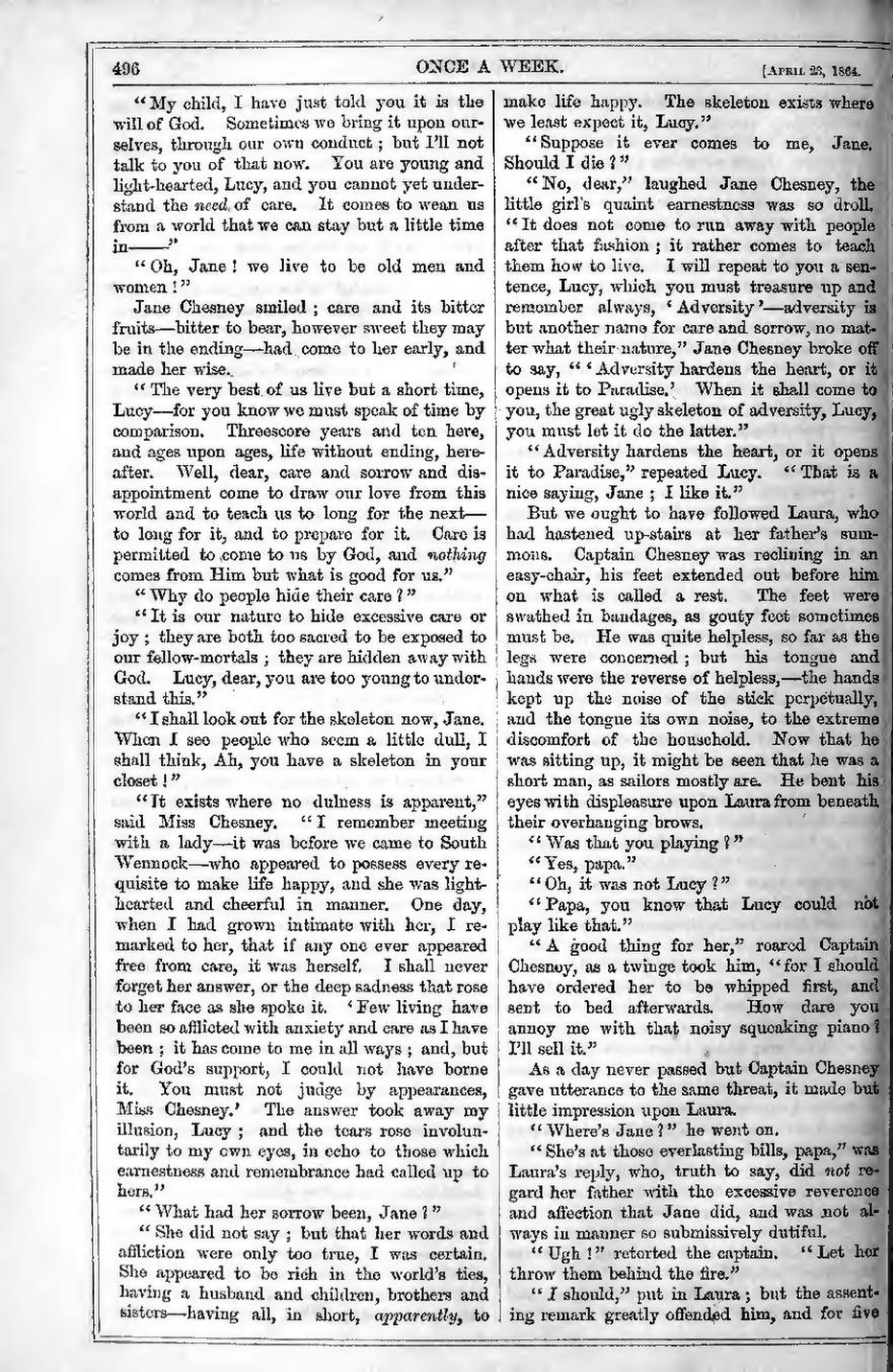“My child, I have just told you it is the will of God. Sometimes we bring it upon ourselves, through our own conduct; but I’ll not talk to you of that now. You are young and light-hearted, Lucy, and you cannot yet understand the need of care. It comes to wean us from a world that we can stay but a little time in———”
“Oh, Jane! we live to be old men and women!”
Jane Chesney smiled; care and its bitter fruits—bitter to bear, however sweet they may be in the ending—had come to her early, and made her wise.
“The very best of us live but a short time, Lucy—for you know we must speak of time by comparison. Threescore years and ten here, and ages upon ages, life without ending, hereafter. Well, dear, care and sorrow and disappointment come to draw our love from this world and to teach us to long for the next— to long for it, and to prepare for it. Care is permitted to come to us by God, and nothing comes from Him but what is good for us.”
“Why do people hide their care?”
“It is our nature to hide excessive care or joy; they are both too sacred to be exposed to our fellow-mortals; they are hidden away with God. Lucy, dear, you are too young to understand this.”
“I shall look out for the skeleton now, Jane. When I see people who seem a little dull, I shall think, Ah, you have a skeleton in your closet!”
“It exists where no dulness is apparent,” said Miss Chesney. “I remember meeting with a lady—it was before we came to South Wennock—who appeared to possess every requisite to make life happy, and she was light-hearted and cheerful in manner. One day, when I had grown intimate with her, I remarked to her, that if any one ever appeared free from care, it was herself. I shall never forget her answer, or the deep sadness that rose to her face as she spoke it. ‘Few living have been so afflicted with anxiety and care as I have been; it has come to me in all ways; and, but for God’s support, I could not have borne it. You must not judge by appearances, Miss Chesney.’ The answer took away my illusion, Lucy; and the tears rose involuntarily to my own eyes, in echo to those which earnestness and remembrance had called up to hers.”
“What had her sorrow been, Jane?”
“She did not say; but that her words and affliction were only too true, I was certain. She appeared to be rich in the world’s ties, having a husband and children, brothers and sisters—having all, in short, apparently, to make life happy. The skeleton exists where we least expect it, Lucy.”
“Suppose it ever comes to me, Jane. Should I die?”
“No, dear,” laughed Jane Chesney, the little girl’s quaint earnestness was so droll. “It does not come to run away with people after that fashion; it rather comes to teach them how to live, I will repeat to you a sentence, Lucy, which you must treasure up and remember always, ‘Adversity'—adversity is but another name for care and sorrow, no matter what their nature,” Jane Chesney broke off to say, "'Adversity hardens the heart, or it opens it to Paradise.’ When it shall come to you, the great ugly skeleton of adversity, Lucy, you must let it do the latter.”
“Adversity hardens the heart, or it opens it to Paradise,” repeated Lucy. “That is a nice saying, Jane; I like it.”
But we ought to have followed Laura, who had hastened up-stairs at her father’s summons. Captain Chesney was reclining in an easy-chair, his feet extended out before him on what is called a rest. The feet were swathed in bandages, as gouty feet sometimes must be. He was quite helpless, so far as the legs were concerned; but his tongue and hands were the reverse of helpless,—the hands kept up the noise of the stick perpetually, and the tongue its own noise, to the extreme discomfort of the household. Now that he was sitting up, it might be seen that he was a short man, as sailors mostly are. He bent his eyes with displeasure upon Laura from beneath their overhanging brows.
“Was that you playing?”
“Yes, papa.”
“Oh, it was not Lucy?”
“Papa, you know that Lucy could not play like that.”
“A good thing for her,” roared Captain Chesney, as a twinge took him, “for I should have ordered her to be whipped first, and sent to bed afterwards. How dare you annoy me with that noisy squeaking piano? I’ll sell it.”
As a day never passed but Captain Chesney gave utterance to the same threat, it made but little impression upon Laura.
“Where’s Jane?” he went on.
“She’s at those everlasting bills, papa,” was Laura’s reply, who, truth to say, did not regard her father with the excessive reverence and affection that Jane did, and was not always in manner so submissively dutiful.
“Ugh!” retorted the captain. “Let her throw them behind the fire.”
"I should,” put in Laura; but the assenting remark greatly offended him, and for five